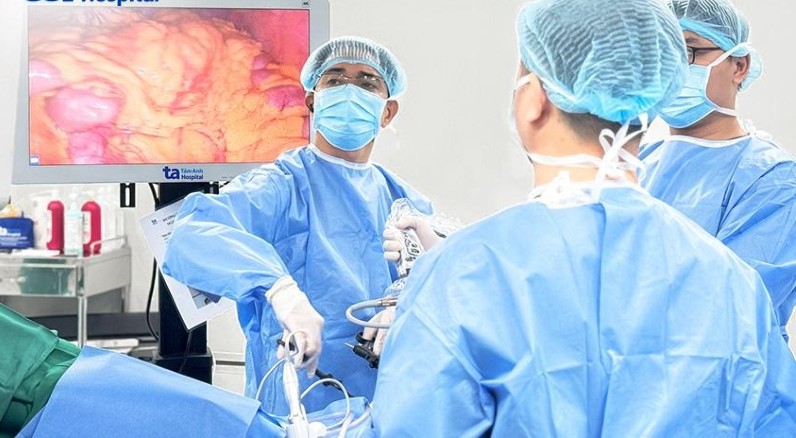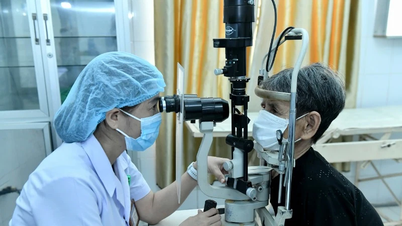Surgery to remove hundreds of malignant colon polyps, completely eradicate cancer
Doctors at a general hospital in Ho Chi Minh City have just performed surgery on a patient who had an endoscopy and discovered hundreds of polyps attached to his colon. They were advised to remove the entire organ to eradicate the cancer.
Specialist Doctor 2 Nguyen Quoc Thai, Center for Endoscopy and Gastrointestinal Endoscopic Surgery, Tam Anh General Clinic District 7, Tam Anh General Hospital, Ho Chi Minh City said that this is a very rare case because the number of polyps is too large, firmly attached and dense in the colon wall with many different sizes.
Before that, the patient did not have any unusual symptoms, except for occasional loose stools. During the endoscopy, the doctor discovered many polyps of various sizes, many of which were larger than 2cm with an abnormal structure, wide base, and no sessile stem. In addition to the polyps removed for biopsy, the patient still had hundreds of polyps of various sizes in the colon and rectum.
Suspecting malignancy, the doctor performed a biopsy of the colon polyp. The result was that the patient had stage 2 invasive adenocarcinoma (invading the submucosa), without vascular or nerve invasion, and was classified as stage 1 cancerous polyp.
 |
| Illustration |
After the patient was anesthetized with endotracheal intubation, the doctor inserted an endoscope into the abdomen, examined the colon up to the hepatic flexure and noted that the tumor had not invaded the serosa. The doctor continued to open the peritoneum along the inferior mesenteric artery, removed and cut the inferior mesenteric artery near the angle, and mobilized the left colon and upper rectum.
Perform sequential cutting, cut the artery, ileocecal vein, to the middle colon blood vessels, the terminal ileal mesentery, cut the ileum 15 cm from the ileocecal angle and cut almost the entire pelvic colon. Finally, the doctor connects the ileum to the pelvic colon.
During surgery, the doctor found that there were many polyps in the lower rectum. However, if the entire rectum was removed, it could cause bowel disorders, causing the patient to defecate many times a day, affecting the quality of life. Therefore, the doctor proceeded to remove polyps in the lower rectum through the anus.
Postoperatively, the patient recovered well, was able to walk and eat 2 days after surgery and was discharged 5 days later. The next step is for the patient to continue to have endoscopy to remove any remaining polyps and have regular endoscopy every 6-12 months to promptly detect new polyps if any.
The cause of most colon and rectal polyps is still unknown. Many studies show that colon and rectal polyps are formed due to genetic mutations that cause abnormal cell growth to form polyps.
Due to an unbalanced diet (eating a lot of red meat), lack of exercise, low fiber intake, obesity, smoking, chronic colitis... In addition, genetic factors also increase the risk of colon and rectal polyps.
There are two basic types of colon polyps: benign hyperplastic polyps and adenomatous polyps. Of these, adenomatous polyps have a high risk of developing into cancer. It is estimated that up to 90% of colorectal tumors arise from adenomatous polyps. However, the disease is difficult to detect because most of them have no or vague symptoms.
To detect colorectal polyps early, it is important to have regular health check-ups. Normal people should be screened for polyps and colon cancer starting at age 45.
People at high risk (such as having relatives with colorectal cancer or advanced polyps under the age of 60) should be screened earlier (before the age of 40). In particular, they should be examined immediately if they have unusual symptoms such as prolonged digestive disorders, changes in bowel habits, fatigue, unusual weight loss, etc.
Doctors say that colorectal cancer can be completely cured if diagnosed at an early stage. Currently, modern endoscopy machines, with sharp 4K technology, hundreds of times magnification, and special light sources help detect polyps, cancer, and gastrointestinal ulcers at an early stage.
In particular, the device also integrates artificial intelligence (AI) technology to help warn of polyps or cancer during endoscopy, even small, flat lesions that are easily missed.
Source: https://baodautu.vn/phau-thuat-cat-hang-tram-polyp-dai-trang-hoa-ac-triet-can-ung-thu-d226198.html


































![[Photo] Ho Chi Minh City: Many people release flower lanterns to celebrate Buddha's Birthday](https://vphoto.vietnam.vn/thumb/1200x675/vietnam/resource/IMAGE/2025/5/10/5d57dc648c0f46ffa3b22a3e6e3eac3e)
![[Photo] General Secretary To Lam meets with Chairman of the Federation Council, Parliament of the Russian Federation](https://vphoto.vietnam.vn/thumb/1200x675/vietnam/resource/IMAGE/2025/5/10/2c37f1980bdc48c4a04ca24b5f544b33)

















































![[Infographic] How much more will people have to pay when household electricity prices increase by 4.8% from today, May 10?](https://vphoto.vietnam.vn/thumb/402x226/vietnam/resource/IMAGE/2025/5/10/4a5fc910eb8a4113aadcd7a62655e5d6)















Comment (0)